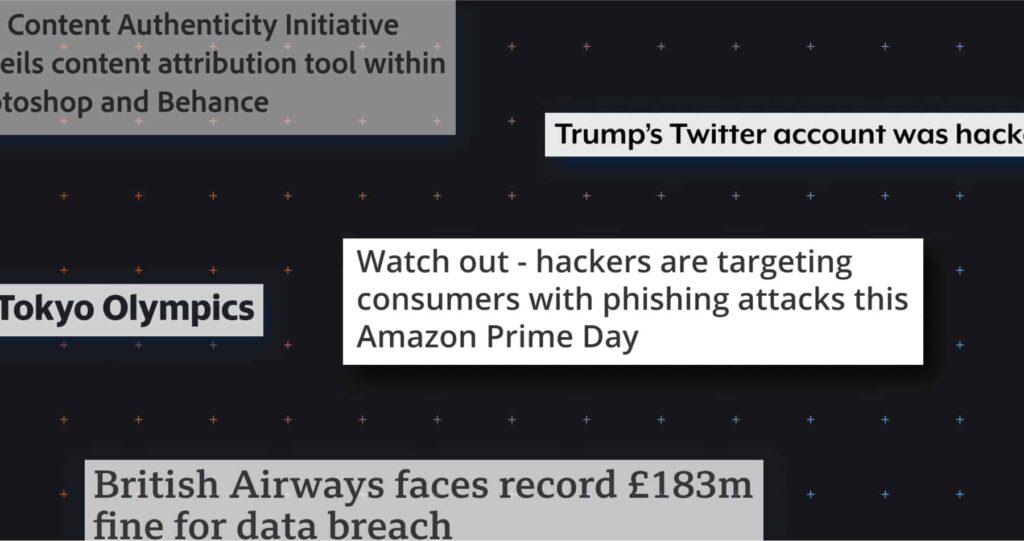October 2020 has been another remarkable month in cybersecurity. And, since COVID-19 sent the world indoors and made us ever-more reliant on the internet, the importance of information security and data protection has never been more apparent.
October saw numerous high-profile data breaches, cyberattacks, and online scams — but also brought us one of the biggest GDPR fines yet, an innovative solution to deepfake technology, and even more jostling between the US government and Chinese big tech.
Let’s take a look at the biggest cybersecurity headlines of October 2020.
Paying Cyberattack Ransoms Could Breach International Sanctions Rules
New guidance from the US Treasury has big implications for companies hit by ransomware attacks from certain countries.
(Companies affected by ransomware find their files encrypted — replaced by useless strings of seemingly random characters — with cybercriminals promising to return the data if the company pays a ransom.)
Paying up might be the least-worst option where a company’s critical data is at stake…ut according to an October 1 US Treasury advisory note, paying cyberattack ransoms could violate legal rules on international sanctions.
Businesses suffering a ransomware attack by hackers from a sanctioned country — like Iran, China, or Russia (where many such attacks do originate) — now face the threat of huge fines and legal action if they choose to buy back their files.
The Treasury’s advice reiterates what cybersecurity leaders have been saying for many years: in cybersecurity, prevention is far better than cure.
Amazon Prime Day Sees Huge Spike in Phishing Scams
With millions of consumers confined to their homes, this year’s Amazon Prime Day was a chance for millions of shoppers to grab a bargain — and an unmissable opportunity for cybercriminals to steal their personal information.
October 8 research from Bolster detected over 800 “spoof” Amazon webpages in September (up from 50 in January), as fraudsters ramped up their phishing efforts in anticipation of the two-day Amazon Prime Day event, hosted October 13-14.
Some sites looked near-identical to Amazon’s genuine web properties, with perfectly duplicated branding and convincing domain names. Unwary shoppers were asked for details such as their CVV2 code and social security number.
See what advice Tessian co-founder and CEO, Tim Sadler, offered consumers in Tech Radar.
FBI Warns of Ransomware Attacks Targeting Healthcare Providers
UK Public Body Unable to Provide Services Follow “Serious Cyberattack”
On October 14, Hackney London Borough Council, a UK local government body, announced that it had fallen victim to a “serious cyberattack.”
In an update two days later, the council revealed the extent of the damage. Among other things, the council was unable to accept rent payments, process planning applications, or pay some social security benefits.
The council said it was “working hard to restore services, protect data, and investigate the attack,” but that services could remain unavailable for “some time.”
UK Data Regulator Issues $26 Million Fine to Airline
UK airline British Airways received a £20 million ($26 million) fine on October 17 for “failing to protect the personal and financial details of more than 400,000 of its customers.” The fine relates to a cyberattack suffered by the company in 2018.
The Information Commissioner’s Office — the UK’s data protection authority — found that the airline had failed to limit access to data, had not undertaken sufficiently rigorous testing, and should have implemented multi-factor authentication on its employee and third-party accounts.
The British Airways fine amounts to the fourth-largest GDPR fine of all time — but the airline actually got off relatively lightly, considering that the fine was initially touted as £183 million ($238 million).
To learn more about compliance standards like the GDPR (including the largest breaches and fines to-date) check out The CEO’s Guide to Data Protection and Compliance.
Adobe Launches Content Authenticity Initiative Tool to Fight Deepfakes
As video and audio manipulation techniques become more accessible, cybersecurity and intelligence experts have been warning about a potential onslaught of deepfakes that could have an unprecedented impact on security, politics, and society.
Not sure what a deepfake is? Read this article.
Cybercriminals can use deepfake technology to create video or audio clips of high-profile and trusted individuals. Deepfakes have already been used in phishing attacks and could also be used for blackmail and disinformation campaigns.
On October 20, Adobe’s Content Authenticity Initiative announced a new tool that will add “a secure layer of tamper-evident attribution data to photos, including the author’s name, location, and edit history” to help creatives authenticate their content.
Once deepfakes are sufficiently convincing, there might be no way to distinguish them from genuine material. Adobe’s project marks a promising first step in this emerging security front.
Hackers Discover 55 Vulnerabilities Across Apple’s Systems
A group of hackers earned $300,000 via Apple’s bug bounty scheme after identifying 55 vulnerabilities across Apple’s infrastructure.
The security issues included vulnerabilities that would have allowed an attacker to “(take) over a victim’s iCloud account,” “fully compromise an industrial control warehouse software used by Apple,” and “access management tools and sensitive resources.”
The group said Apple had fully addressed the majority of vulnerabilities reported.
Around 3 Million Credit Cards Compromised After Breach at US Restaurant Franchise
On Oct 12, details of around 3 million credit cards were posted on the dark web following a huge data breach at US restaurant franchise Dickey’s Barbeque Pit.
According to an investigation by Gemini Advisory, 156 of 469 Dickey’s outlets were involved in the breach, with the highest levels of exposure present in California. The details appear to have been stolen between July 2018 and August 2020.
Given California’s strict data breach rules, including a private right of action under the California Consumer Privacy Act, Dickey’s could be liable for some eye-watering sums if the breach is found to have resulted from lax cybersecurity practices.
Questions about the CCPA? We answer 13 of them in this article: CCPA FAQs: Your Guide to California’s New Privacy Law.
Russia Planned to Launch 2020 Olympics Cyberattack
The GRU, Russia’s military intelligence agency, “conducted cyber reconnaissance against officials and organizations” involved in the Tokyo 2020 Olympic and Paralympic Games, according to a UK government announcement on October 19.
Russian cybercrime groups are alleged to have targeted “organizers, logistics services, and sponsors.” The Games were originally due to tale place this summer but were postponed due to COVID-19.
The UK government also revealed the full extent of Russia’s hacking campaign against the 2018 Winter Games, during which Russian hackers are alleged to have disguised themselves as Chinese and North Korean attackers to target the opening ceremony in Seoul, South Korea.
ENISA 2020 Threat Landscape Report Shows Increase in Cyberattacks
The European Union Agency for Cybersecurity (ENISA) released its 2020 Threat Landscape Report on October 20, and cybersecurity leaders (unfortunately) won’t be surprised at its conclusion: cybercrime is on the increase.
The report cites “a new norm,” triggered by the COVID-19 pandemic, in which the world is even more dependent on “a secure and reliable cyberspace.”
ENISA found that the number of phishing victims “continues to grow,” that Business Email Compromise (BEC) resulted in “the loss of millions of euros,” and that state-sponsored actors are propagating “finely targeted and persistent attacks on high-value data.”
If you’re a security leader looking for solutions to these problems, click here to learn more about how Tessian Defender detects advanced impersonation attacks that slip past SEGs, native features, and legacy tools.
Researcher Breaches US President’s Twitter Account By Guessing Password
Dutch “ethical hacker” Victor Gevers found himself in control of Donald Trump’s Twitter account on October 16 after guessing the US president’s password.
Trump’s Twitter account has over 87 million followers and is frequently used to deliver messages of international importance. Gevers said he correctly guessed the password, “maga2020!”, after seven attempts.
The incident reveals that the president was using a simple, easy-to-guess password, and that he had multi-factor authentication disabled. Rectifying either of these two basic security errors would have prevented unauthorized access to the account.
Overruling of WeChat Ban Denied by California Judge
Another month, another development in the long-running battle between the US government and Chinese tech firms.
On October 23, California struck a blow to the Trump administration’s efforts to restrict WeChat — a Chinese app used for currency transfers, social networking, and instant messaging.
In September, the US Department of Commerce ordered Apple and Google to stop distributing WeChat via their app stores, citing security issues. The order was blocked in California following a legal challenge by WeChat. The US Justice Department brought further evidence and asked the court to reverse its WeChat ruling.
The court declined to change its decision, meaning that the Commerce Department’s banning order will remain unenforced in California — despite the federal government’s allegations regarding WeChat’s security issues.
Finnish Therapy Center Hacked, Exposing Patient Data
One of the most shocking data breaches of 2020 was brought to light on October 24, when Finnish psychotherapy center Vastaamo revealed a hack that compromised hundreds of patient records.
The highly sensitive nature of the breach means that it is being taken extremely seriously. Finland’s interior minister summoned a cabinet meeting to determine how best to respond to the breach, promising “speedy crisis help” to the affected individuals.
The hackers are demanding a ransom in exchange for the return of the files, which were reportedly accessed between November 2018 and March 2019.
The ransomware attack further suggests that businesses worldwide lack proper cybersecurity infrastructure — even when handling highly sensitive and valuable data.












